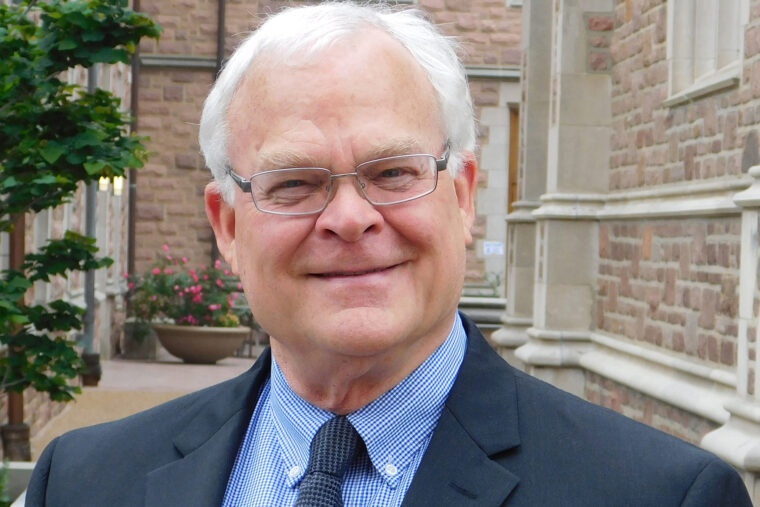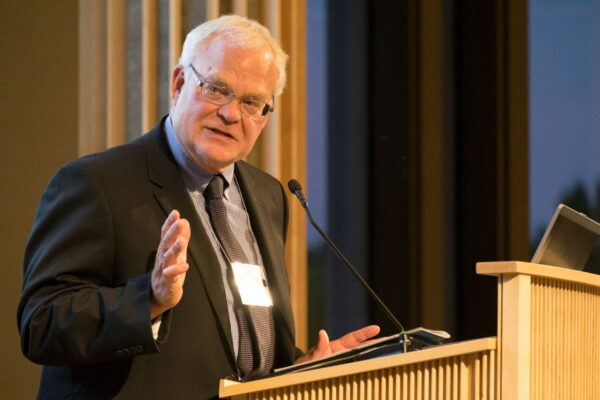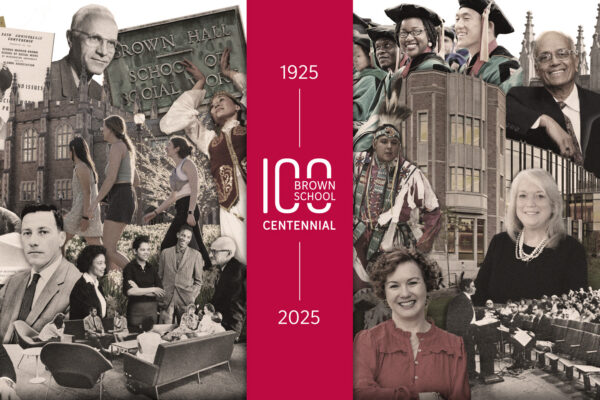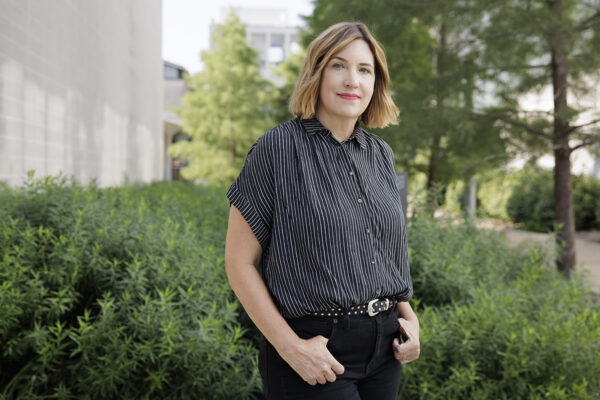Michael Sherraden has spent his career developing Child Development Accounts (CDAs) that are now making a difference nationally and internationally.
Before becoming a professor at the WashU Brown School, Sherraden grew up in Kansas and worked at a small family grocery store. Recruited via a “geographical admissions” policy, he attended and graduated from Harvard University in 1970 before earning a master’s in social work and then a PhD from the University of Michigan.
Sherraden, who is today the George Warren Brown Distinguished University Professor at Washington University in St. Louis, has dedicated much of his research to asset building.
His interest in the topic stemmed from personal experience. Opening a retirement account as a new faculty member unexpectedly highlighted the importance of asset building.
“I came from a modest background with no asset accumulation. I had educational debt and kids,” Sherraden said. “I signed up for a retirement account, where I’d receive quarterly statements informing me the money had grown. The idea that there might be a little extra money was a new idea in my life.”
Sherraden attended a faculty meeting to discuss retirement plans. At the time, he was a young social work professor with an interest in social policy. He noted the meeting was unusually full. “I walked in and asked myself, why are all these faculty members in the room? I knew it was because somebody had accumulated this money for us, and that captured all of our attention.”
It occurred to him that this was the exact opposite of what a mainstream economist would think. Economists believe that if you start to think and behave differently, you can accumulate assets. In this case, the opposite was true. “I could see that if assets accumulated, people would start to think and behave differently,” he said.
This realization allowed Sherraden to leverage his personal experience for social development. He asked the question: Why shouldn’t we pursue asset building, not just for college professors, but also for the poor?
In 1991, after a great deal of thought, he wrote “Assets and the Poor,” and the book started a new policy discussion. Prior to this, no one was paying attention to the assets of poor people as a policy concept. Sherraden coined the terms “inclusive asset building” and “asset-based policy.” After decades of research and policy, the idea of universal asset building is now a common topic in policy discussion in the United States and globally.
Sherraden’s work a blueprint for national policy
Fast forward to 2025: Growing bipartisan support for universal, lifelong asset-building led Congress to enact Trump Accounts earlier this year as part of the “One Big Beautiful Bill.” Sherraden sees potential in the policy, but said adjustments are needed. To enable all children to participate in asset building, Sherraden proposes automatic account enrollment. The details of the federal accounts, which include an initial deposit of $1,000 for each child, are still being sorted out.
He’s pleased to have a seat at the table. “This is applied social science. We aren’t advocating or lobbying, we’re taking evidence to the policy process,” said Sherraden, founder of WashU’s Center for Social Development (CSD).
Transforming theory into policy
Sherraden’s research into universal asset building and CDAs helped to lay the foundation for Trump Accounts. He wanted to test a scalable policy structure, so in 2007, he launched the SEED OK experiment. CSD chose Oklahoma due to large subpopulations of Black, Hispanic and Indigenous people, plus a good 529 college savings plan with low fees.
Philanthropic foundations such as the Ford Foundation and the Charles Stewart Mott Foundation became major funders.
The CSD strategically redesigned the structure of the 529 plan to serve all children, automatically enrolling treatment children at birth. Families had the ability to opt out, but only one did.
“SEED OK is impeccable social science, a true experiment in a total population sample, with random assignment to treatment and control groups,” Sherraden said. He emphasized an important progressive principle of SEED OK: less wealthy children in the treatment group received larger matches for their investments.
Sherraden found that treatment kids of all incomes performed better in asset building than those in the control group. The experiment provided causal evidence that universal asset-building policy reduces both educational and wealth inequality, making it a sound investment for taxpayers too. Sherraden summed up the findings: Universal asset-building leads to “social and economic development of families, with better educational and residential outcomes, expanded choices and improved lives.”
The findings from SEED OK have been instrumental for CDA implementation both nationally and globally.
CSD has advised in creating inclusive CDA policies in 7 U.S. states, both blue and red. Nebraska, for example, endorsed a universal CDA policy with a unanimous vote in the legislature. Sherraden has never viewed CDAs as a partisan idea.
In the U.S., there are now over 8 million children with assets CDAs, and 95% of the accounts are based on the SEED OK policy model. The research also has influenced other countries, among them Singapore, Israel and Kazakhstan, to implement universal CDAs.
Social policy and changing times
Sherraden thinks about social work broadly — not just helping people but also enabling them to develop to reach their potential. In this regard, social policy is an important topic as the world continues to rapidly change.
“Social welfare policy developed during the last century in response to industrial society. Social welfare in the 20th-century sense means that if you don’t have labor income (due to unemployment, disability, retirement or other circumstances) income-based social policy can address the issue. It’s important to acknowledge the scale of social policy,” Sherraden said. “Social and health policy makes up over half of all federal government expenditures. In a budgetary sense, social policy is the main business of modern states. It is very important to make all of this spending as effective as possible.”
Sherraden predicts social development policy will continue to expand alongside social welfare policy. “It’s not an accident that our center is called the Center for Social Development. We are making a statement that social policy will have to make a change in this century,” Sherraden said.
By the end of the 21st century, he predicts asset-based policy may be approximately equivalent to income-based policy in America, and universal CDAs are a first step. CSD has been diligently working to build social innovations.
“I feel very fortunate to try to add something positive in the world. It is a privilege to try. I enjoy the work,” he said. “The team at CSD is remarkable, and we have many great partners across the country and around the world.”
Sherraden’s impact
Dorian Traube, the Neidorff Family and Centene Corporation Dean of the Brown School, said Sherraden’s policy proposals have been transformative.
“Michael Sherraden’s scholarship transformed social work by insisting that we not only respond to poverty but design systems that build assets, dignity and opportunity,” Traube said. “His visionary work on Individual Development Accounts reshaped policy, expanded the reach of our profession and set a standard for how rigorous research can spark lasting social change.”
Jin Huang, the Irving Louis Horowitz Professor in Social Policy, works closely alongside Sherraden as the CSD’s associate director for research.
“Michael doesn’t just build ideas, knowledge, and policy — he builds people,” Huang said. “Working with him for more than 20 years has been one of the greatest privileges of my career. He’s an extraordinary mentor — steady, generous, open and deeply committed to lifting others. I still remember walking with him through Times Square on my first visit to New York, and traveling with him to Taiwan, China and Azerbaijan — sharing street food and stories as we talked about the future of social policy.
“Those experiences, as much as the research itself, shaped how I think about scholarship and leadership. For those of us fortunate to work alongside him, he’s shown what it means to do scholarship that truly changes lives.”



